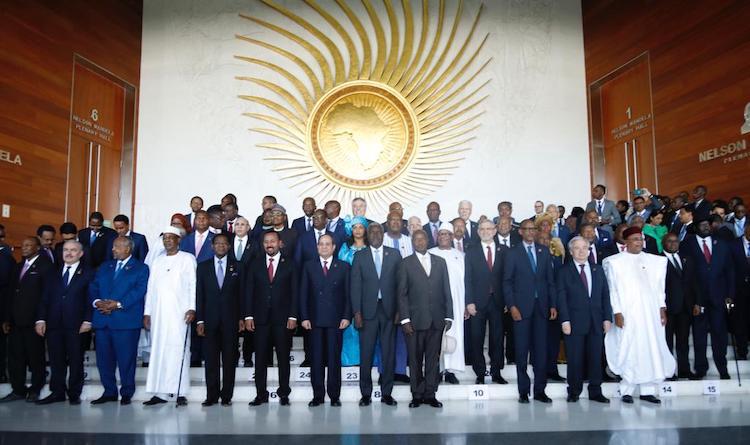The African Union’s new leadership has some fresh faces. But it will be hard for the newcomers to overcome the AU’s lack of political will to solve the continent’s crises, writes DW’s Mimi Mefo Takambou.
 The African Union, with its seat in the Ethiopian capital Addis Ababa, was officially launched in 2002
The African Union, with its seat in the Ethiopian capital Addis Ababa, was officially launched in 2002
Changes in leadership are a rare phenomenon in many parts of Africa.
So, whenever this happens, we Africans get excited about what the new leadership could bring to our continent, which has been stuck for so long in a morass of economic stagnation, unemployment and conflict.
That’s why, like many of us, I’ve been closely watching the African Union’s elections for a new chairperson and new heads of the commission.
But I have mixed feelings about the results.
ADVERTISEMENT
I was exhilarated to see Monique Nsanzabaganwa from Rwanda elected by the assembly as deputy chairperson of the AU Commission. The first woman to hold the position, she brings a breath of fresh air to the leadership.
Nsanzabaganwa describes herself as striving to live by Biblical standards, holding that “where there is no vision, the people perish.” In line with this, the trained economist has a record of championing programs targeting women and a laser focus on the empowerment of all Africans.
Being from Rwanda, Nsanzabaganwa is also no stranger to the devastating impact of conflict and genocide.
We Africans can only hope that she truly embodies a new vision that will help our people.
On the other hand, for close to a decade, Nsanzabaganwa has been a top member of President Paul Kagame’s government, which has indictments for a litany of crimes — from disappearances, politically motivated arrests and murders to the unconstitutional clampdown on dissent through the arrest of critical voices and suppression of press freedom.
 Paul Kagame, seen here delivering a speech at the African Union in 2018, is accused of entrenching his power and cracking down on dissent
Paul Kagame, seen here delivering a speech at the African Union in 2018, is accused of entrenching his power and cracking down on dissent
This is a negative mark on Nsanzabaganwa’s otherwise-positive scorecard. It gives rise to the question of whether Nsanzabaganwa has what it takes to rise above the AU Commission’s lethargic approach to dealing with conflict and autocratic governments on the continent.
Disappointing reelection of Moussa Faki Mahamat
I also ask myself whether Nsanzabaganwa has the strength to work around the whims and caprices of Chad’s Moussa Faki Mahamat, selected for a second term as AU Commission chairperson.
Since 2017, Faki has headed a Commission rife with allegations of sexual harassment, bribery, nepotism, corruption and bullying.
On top of his failures to tackle these issues, Faki has also floundered on bridging the divide between the Anglophone and Francophone caucuses, which he inherited from his predecessor, Nkosazana Dlamini Zuma.
Then there’s the AU’s failure to deal with the continent’s many simmering conflicts, such as the Tigray conflict in Ethiopia, Islamic militancy in Mozambique’s Cabo Delgado and the Anglophone conflict in Cameroon.
Faki, who was prime minister and foreign affairs minister under Chad’s sit-tight president, Idriss Deby, has also stayed silent on the situation in his home country. He was AU Commission head in 2018, when Chad approved a new constitution that expands Deby’s powers and allows him to stay in office until 2033.
That makes me think that perhaps charity does begin at home.
For all of these reasons, I don’t understand why Faki was re-elected for a four-year term by 51 of the AU’s 55 member states.
Felix Tshisekedi shows glimmer of promise as new AU chairman
When he was sworn in as president of the Democratic Republic of Congo in January 2019, Felix Tshisekedi inherited not only a country with immense economic resources, but also a nation at the epicenter of what some commentators call “Africa’s world war.”
Since then, Tshisekedi has taken pains to distance himself and his presidency from the influence of former President Joseph Kabila, giving the impression that he wants to abandon old ways of doing things.
Tshisekedi promised in his December 2019 State of the Union address that “2020 will be the year of action,” sounding keen to take the embattled nation’s shattered institutions to the dry cleaners.
If Tshisekedi manages to steer the AU in the same decisive way as he has the Congo, I believe he might have an impact at the helm of the African body.
Tshisekedi, however, has big shoes to fill, given that the coronavirus pandemic gave his predecessor, South African President Cyril Ramaphosa, the opportunity to pivot the AU command into a continental leadership position.
As well as convening several meetings about the coronavirus, Ramaphosa also successfully mediated the dispute over the Grand Ethiopian Renaissance Dam, thereby establishing the AU’s legitimacy to negotiate on, and intervene in, peace and security matters.
The real test for Tshisekedi will be his ability to show similar leadership in his one-year term as AU chairman.
AU fails to silence guns
When the African Union launched its campaign for “Silencing the Guns in Africa by 2020,” I was mildly optimistic — I felt that the continent’s leadership was focusing on what truly mattered for the first time in its history.
“Silencing the Guns” has lofty goals. It seeks to prevent genocides and end wars and conflicts across the continent, bringing peace to millions while stopping human rights violations and lessening humanitarian disasters.
Just last month, however, the AU extended its deadline for bringing peace on the continent by another decade, demonstrating its inability to help build an Africa free of conflict.
As such, I am now at a loss as to what the priorities of the new leadership will be — beyond COVID-19 of
course.
This article has been adapted from its original source
Statements, comments or opinions published in this column are of those of the author(s) and do not necessarily reflect the editorial policy of Warsan magazine. Warsan reserves the right to moderate, publish or delete a post without prior consultation with the author(s). To publish your article or your advertisement contact our editorial team at: warsan54@gmail.com





